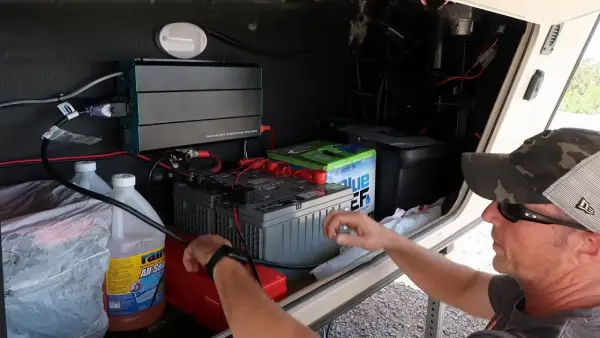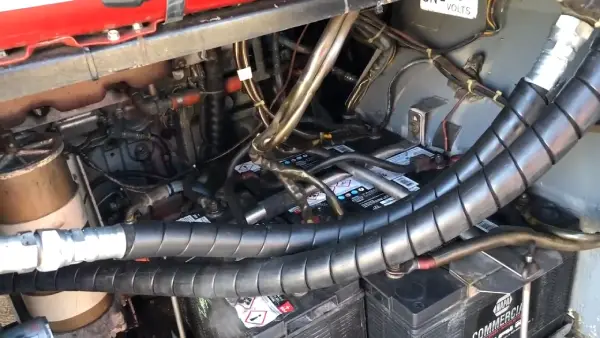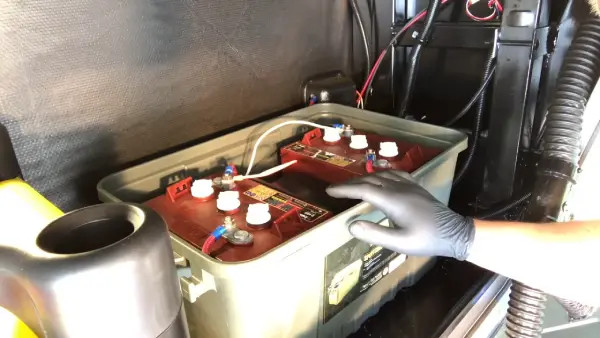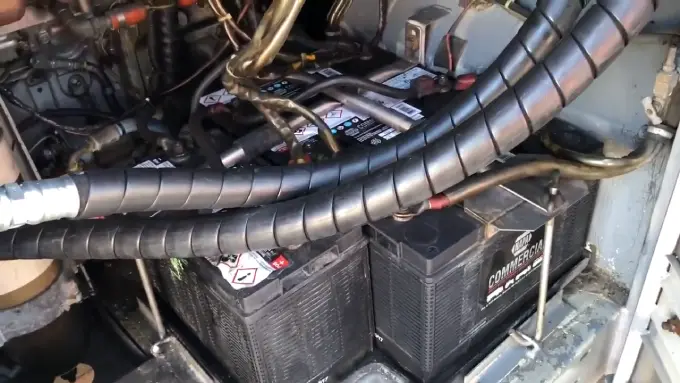Last Updated on May 4, 2023
Are you experiencing an overcharged RV battery? If so, you’re not alone. Overcharging is a common issue for many RV owners, and it can be frustrating to deal with. But don’t worry. Understanding why your RV battery is overcharging is the first step in solving the problem.
One of the main causes of an overcharged RV battery is a faulty voltage regulator. Improperly wired solar panel systems and damaged alternators can also cause the battery to overcharge. And a shorted cell in the battery itself can result in an overcharged state.
Throughout this article, we will explore the possible causes of an overcharged RV battery and provide some tips on how to prevent it from happening in the future. So buckle up and let’s dive into the world of RV batteries.
Why Is Your RV Battery Overcharging: Common Causes

RV batteries are a crucial component of any recreational vehicle, providing power for appliances and electronics when not connected to an external power source.
However, overcharging can significantly damage the battery and reduce its lifespan. You should be aware of several common causes of RV battery overcharging.
No 01: Faulty Voltage Regulator
A faulty voltage regulator is one of the most common causes of an overcharged RV battery. The voltage regulator regulates the amount of charge that goes into the battery from the charging system. If it fails to regulate properly, it can cause overcharging and damage to the battery.
One sign of a faulty voltage regulator is when the battery is constantly overcharged, even when there is no load. This means the charging system puts out more voltage than necessary, causing the battery to overcharge. Another sign is when the battery gets hot while charging or discharging. This indicates that too much current flows through the battery, which can cause damage.
To avoid a faulty voltage regulator, having your RV’s electrical system regularly inspected and maintained by a professional is important. They can check for any signs of wear or damage and replace any faulty components before they cause further issues.
Suppose you suspect that your RV’s voltage regulator may be faulty. In that case, it’s important to have it checked as soon as possible to prevent further damage to your battery and electrical system.
No 02: Improperly Wired Solar Panel System
An improperly wired solar panel system can be a common cause of overcharging an RV battery. This happens when the solar panels are not connected to a charge controller or if the charge controller is not functioning properly.
A charge controller regulates the amount of voltage and current that goes into the battery, preventing it from overcharging. Without a charge controller, the solar panels will continue to send power to the battery even when it is fully charged, causing damage to the battery.
Also, if the wiring between the solar panels and the charge controller or between the charge controller and the battery is incorrect, this can also lead to overcharging. It’s essential to follow proper wiring guidelines and consult a professional if you’re unsure how to wire your solar panel system.
Install a high-quality charge controller compatible with your RV battery to prevent overcharging due to an improperly wired solar panel system. Regularly inspect and maintain all solar panel system components, including wiring connections and fuses or breakers.
No 03: Damaged Alternator
A damaged alternator is one of the common causes of RV battery overcharging. The alternator is responsible for charging the battery while the engine is running, and if it’s not functioning properly, it can lead to overcharging.
One sign of a damaged alternator is when the battery warning light on the dashboard illuminates. This indicates that the alternator is not producing enough voltage to charge the battery properly.
Another sign is when the RV battery becomes hot to the touch or emits a burning smell, which can be caused by excessive charging.
A damaged alternator can seriously affect your RV battery’s lifespan and performance if left unchecked. Overcharging can cause damage to the internal structure of the battery, leading to reduced capacity and a shortened lifespan. It can also cause electrolyte boil-off, damaging your RV’s electrical components.
To prevent overcharging caused by a damaged alternator, regular maintenance and inspection are crucial. Check your RV’s electrical system regularly with a qualified technician who can diagnose any issues with your alternator before they become major problems.
More so, installing a charge controller can help regulate charging and prevent overcharging.
No 04: Shorted Cell in Battery
A shorted cell in an RV battery can lead to overcharging and cause much damage. When a cell in the battery is shorted, it cannot hold a charge like the other cells, leading to an imbalance in the battery’s voltage. This imbalance can cause the charging system to work harder than it should, resulting in overcharging.
One way to determine if your RV battery has a shorted cell is by using a multimeter to check the voltage of each cell individually. If one cell has a significantly lower voltage than the others, it may be shorted. Another sign of a shorted cell is if your RV battery is not holding a charge like it used to.
If you suspect that you have a shorted RV battery, you should have it replaced as soon as possible. Continuing to use a battery with a shorted cell can cause damage to other components in your RV’s electrical system, including your alternator and voltage regulator.
To prevent future issues with shorted cells, make sure you are properly maintaining and inspecting your RV battery regularly. Look for any signs of damage or corrosion on the terminals or cables. And avoid deep discharges and overcharging by using a charge controller when charging from solar panels or generators.
What are the signs of an overcharged RV battery?

An overcharged RV battery can cause significant damage and reduce its lifespan. It is essential to keep an eye out for signs of overcharging to prevent any further harm.
A swollen or bulging case is one sign of an overcharged RV battery. This happens when the battery’s internal pressure increases due to excessive charging, leading to the deformation of the battery case.
Another indication is boiling battery electrolyte, which occurs when the electrolyte fluid inside the battery starts boiling due to excessive heat generated from overcharging.
Also, if you notice any flickering lights or dimming appliances, it could be a sign that your RV battery is overcharged. This happens because an overcharged battery cannot hold a charge effectively, so it fails to power appliances efficiently.
It is crucial to take immediate action once you observe these signs of overcharging. Ignoring them may result in reduced battery capacity and shortened battery life. Therefore, regular maintenance and inspection are necessary to avoid such problems.
How often should you check your RV battery for overcharging?
To ensure that your RV’s batteries are functioning optimally, it is recommended that you check for overcharging regularly. The frequency with which you should conduct these checks depends on certain factors. But, as a general rule of thumb, checking for overcharging at least once a month is advisable.
When driving your RV in hot weather conditions, checking your battery for overcharging regularly is crucial. High temperatures can cause your battery to discharge faster than usual, and this may lead to overcharging.
Therefore, it is essential to check your battery levels frequently in hot weather conditions to prevent your battery’s overcharge, which may damage your battery and other critical components.
What are the effects of overcharging on the life of RV batteries?
Overcharging your RV battery can harm its overall lifespan and capacity. When a battery is overcharged, it can lead to reduced battery capacity and a shortened lifespan of the RV battery.
- Reduced Battery Capacity
Overcharging your RV battery can cause the battery to lose its ability to hold a full charge. This means you may be unable to rely on your battery for as long as needed. You may find yourself needing to recharge your battery more frequently or having to replace your battery sooner than expected.
- Shortened Lifespan of the RV Battery
Overcharging your RV battery can also shorten lifespan. When a battery is overcharged, it causes excessive heat, which can damage the internal components of the battery. This damage can result in a shorter overall lifespan for your RV battery.
Maintain Your RV Battery Properly To Extend Its Life and Performance

Understanding the common causes and signs of overcharging in your RV battery is essential for maintaining a healthy power supply system.
Faulty voltage regulators, improperly wired solar panels, damaged alternators, and shorted cells are all factors that can lead to an overcharged RV battery. Overcharging can be detrimental to the lifespan and capacity of your RV battery, leading to reduced performance and needing replacement sooner than expected.
It’s crucial to take preventative measures such as proper maintenance and inspections, installing a charge controller, and avoiding long-term storage without disconnecting your battery.
By following these steps, you can ensure that your RV battery stays in top condition and provides reliable power for all your adventures. Remember, a well-maintained RV battery means more time enjoying the great outdoors rather than worrying about power issues.


